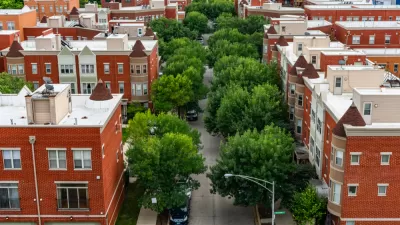Analysis of a city's zoning and land use decisions over seven decades reveals the role race plays in decision making.

Andrew H. Whitmore, an assistant profesiof or City and Regional Planning and the University of North Carolina, Chapel Hill, has completed research into racial bias in land use decisions, explained in an article for CityLab.
Whitmore analyzed 70 years of zoning practices in Durham North Carolina.
The research suggests an interesting correlation between zoning outcomes and the race of local legislators. My analysis also indicates that race historically influenced zoning decisions but that this changed—in particular during the 1980s as the city elected an increasing number of black legislators.
More specifically:
I found that from 1945 through 1984, down-zonings occurred in neighborhoods that were on average 71 percent white, and refused up-zonings occurred in neighborhoods that were on average 74 percent white. But the city as a whole was on average only 59 percent white in this period. The areas where these exclusionary zoning decisions occurred were also significantly whiter than the areas where decisions did allow increased density. Similar disparities in income and homeownership were not as evident.
Whitmore presents findings with other variables, like use type and several additional varieties of legislative decisions. The conclusion that race is central to zoning and land use in the city of Durham is inescapable. Whitmore concludes by cautioning against assuming Durham is a singular case.
FULL STORY: When Black Lawmakers Get Elected, Zoning Decisions Change

Alabama: Trump Terminates Settlements for Black Communities Harmed By Raw Sewage
Trump deemed the landmark civil rights agreement “illegal DEI and environmental justice policy.”

Study: Maui’s Plan to Convert Vacation Rentals to Long-Term Housing Could Cause Nearly $1 Billion Economic Loss
The plan would reduce visitor accommodation by 25% resulting in 1,900 jobs lost.

Planetizen Federal Action Tracker
A weekly monitor of how Trump’s orders and actions are impacting planners and planning in America.

Passengers Flock to Caltrain After Electrification
The new electric trains are running faster and more reliably, leading to strong ridership growth on the Bay Area rail system.

Texas Churches Rally Behind ‘Yes in God’s Back Yard’ Legislation
Religious leaders want the state to reduce zoning regulations to streamline leasing church-owned land to housing developers.

Grand Rapids Mayor Proposes Garage Conversion Plan
The mayor says allowing homeowners to convert garages to dwelling units could alleviate the city’s housing shortage.
Urban Design for Planners 1: Software Tools
This six-course series explores essential urban design concepts using open source software and equips planners with the tools they need to participate fully in the urban design process.
Planning for Universal Design
Learn the tools for implementing Universal Design in planning regulations.
Caltrans
Smith Gee Studio
Institute for Housing and Urban Development Studies (IHS)
City of Grandview
Harvard GSD Executive Education
Toledo-Lucas County Plan Commissions
Salt Lake City
NYU Wagner Graduate School of Public Service





























